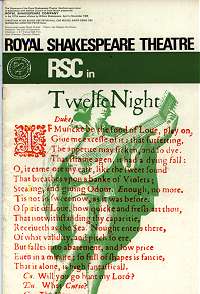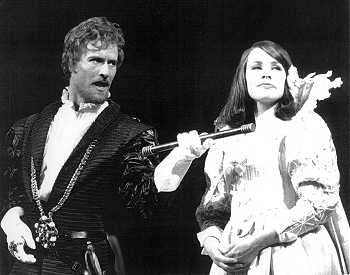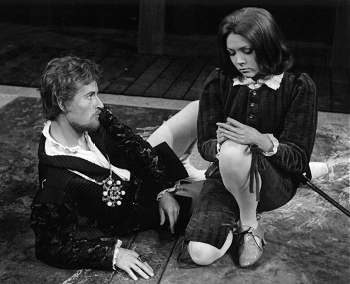
 |
Another Playwright Misunderstood'Columns are to architecture what melody is to music,' says Stendhal somewhere on his travels through Italy, and would have been pleased with both in the first minutes of Twelfth Night at Stratford: Orsino stands before a row of slender columns, listening in an attitude of conscious ecstasy - a rose in one outstretched hand, one foot poised on a stool in the centre of an empty, polished marble floor - to 'That strain again; it had a dying fall.' Orsino is a prince of the Renaissance; and Clifford William's production is built round that assumption, which is perhaps why it has been received with such a notable lack of enthusiasm. The chief complaint seems to be that it lacks 'poetry and pathos'; the answer is that this is not our kind of poetry, nor our kind of pathos. |
 |
|
Part of the trouble is no doubt a sentimental disappointment. There is nothing fanciful about this particular Illyria: that severe colonnade, that gleaming floor, the tall, slim, sallow-featured gentlemen of Orsino's court, all belong specifically to the Italian High Renaissance. Even the lighting, by John Bradley, recalls the soft, powdery light of quattrocentro Tuscan painters, and Sally Jacobs has used their warm reds and browns, with an odd splash of peacock blue or a painted orange tree, for her sets and costumes. And Alan Howard's delivery of the famous first speech - dealing out the syllables as Beerbohm would have said - shows a Renaissance delight in luxury and artifice. Also more than a hint, in his glistening eyes and sensuous lips, of Renaissance barbarity - 'my desires, like fell and cruel hounds, E'er since pursue me.' Twelfth Night down the ages has acquired a misleading reputation as an elegant and amiable piece of nonsense, 'never straying into lewdness,' as Quiller-Couch has it, a romp in short and wishy-washy to boot. It is an impression this production should go far to counteract. The play was, after all, as Dr Hotson argues, very likely first performed on January 6, 1601, before Queen Elizabeth and in honour of the real Duke Orsino - who, as a child of four, had watched Webster's hideous tragedy of The White Devil acted out in real life; who was son to Brachiano and his murdered Duchess, stepson of the White Devil herself; and who was passing through London on his way home to the Pitti Palace in Florence after accompanying Maria de'Medici on her bridal journey into France. At all events, Twelfth Night was written for a magnificent and a savage age. One is apt to forget that it ends with bloody coxcombs and broken heads and a surgeon blind drunk at eight in the morning; that of the two sea-captains who happen to land in Illyria, one is swiftly imprisoned and the other goes in well-justified fear of his life; also that strange, prophetic passage near the end of the play, when Orsino's 'thoughts are ripe in mischief' and, like Othello and in much the same words, he threatens to kill the thing he loves. Viola's reply is not Desdemona's but it is given in the same spirit: 'most jocund, apt and willingly' she accepts death at her lover's hands. The difference is, of course, that Orsino is only playing at jealousy, as he has played all along at love. It is not even clear whether it is Olivia or Viola he means to kill. But, throughout, their triangular relationship - delicately brought out, on two sides at least, in this production - is the central ambiguity of this strangely ambiguous play. An aura of desire, narrowly and deliciously averted, hangs over all the scenes between Orsino and his 'dear lad,' Viola/Cesario. At one point, as his page, she undresses him, draws off his gloves, takes his hat and cloak, half-caressing, half-shrinking from the touch. For both, pleasure and pain are intensified by the role she plays as go-between in his formal courtship of Olivia. |
|
The cruelty latent in Orsino is blatant in Brewster Mason's Toby - none of your tedious, potbellied knights, this Sir Toby is a dangerous smooth man, much given to cocking one booted thigh across the other as he lounges in his large armchair. Jolly he may be, but there is nothing innocent in his jollity. If Sir Toby says it is the moneybags he wants from Aguecheek, Mr Mason makes it plain it is, in fact, the exercise of power. Drink with him is a prelude to a peculiarly subtle form of baiting, in which Sir Andrew is his victim and Feste both audience and partner. Norman Rodway is a white-haired Fool, still agile but with a suspicion of stiffness in the joints; he gives the impression that the wind and the rain can't hold off for long. The favourite device, in their mutual pastime of twitting Sir Andrew, is, of course, the innuendo. It is perfectly possible to miss much in this play, but, faced with this Feste, even the most gullible would be hard put to it to share 'Q's' faith that he is 'the cleanest-mouthed' of Shakespeare's fools. In what strikes me as a distinctly Hotsonian production, Mr Rodway and his bauble have found double meanings where even Dr Hotson saw none. |
 |
|
They fly to and fro above the head of David Warner's Sir Andrew - an anxious beanpole, following with dog-like eyes the shafts he can't follow with his mind. It is not for nothing that Sir Toby chooses to go through life under the sign 'legs and thighs.' Not that this production is either goatish or brutal. But precisely because these two elements are present - and the three performances, Orsino, Toby, Feste, do more than anything else to set the tone - other, simpler charms come up brighter, like colours in a newly-restored picture. Chief of these is Diana Rigg's Viola, an exquisite performance which justifies all the compliments paid her within the play. 'Dian's lip is not more smooth and rubious' indeed. Shakespeare was, so far as can be guessed, thirty-seven when he wrote Twelfth Night, last of his comedies before the great tragedies. Mr Williams's production - and here the comparison which has been so freely bandied about, with the same director's Comedy of Errors, is meaningless; an obvious parallel is Peter Wood's sour and sweet Love for Love at the National Theatre - gives above all the Proustian impression, of looking back across time at the sweetness and self-deceptions of youth, equivocal, evanescent and all the more piercing for being beyond recall. |
Hilary Spurling
The Spectator, 24.6.66.
For an interesting discussion of this production and also the 1968 'Much Ado About Nothing, see Penny Gay's ''As She Likes It, Shakespeares Unruly Women'. Routledge, 1994.
The Observer, 19.6.66.